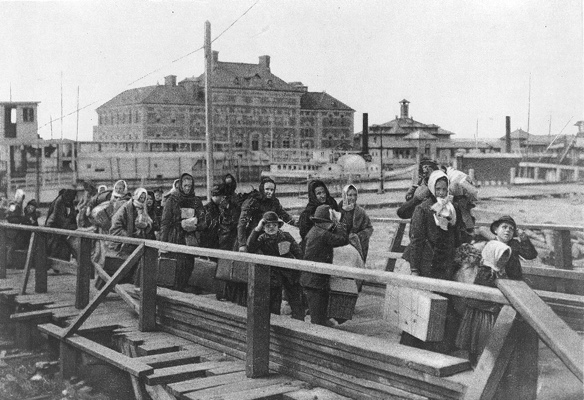Migrants and Asylum Seekers Possess the Resourcefulness We Cherish Most. So Why Are We Turning Them Away?

Immigrants arriving at Ellis Island, 1902
“We are the fastest and the greatest community,” declared President Trump this past summer in Warsaw. “We pursue innovation … and always seek to explore and discover brand-new frontiers. We reward brilliance. We strive for excellence, and cherish inspiring works of art that honor God. We treasure the rule of law and protect the right to free speech and free expression.” In what was heralded as one of his best speeches, President Trump unabashedly praised the West.
This
praise reflects a classic American narrative. Americans push
boundaries and forge new frontiers, demand both liberty and
excellence, and pick themselves up by their bootstraps to make the
most of their humble beginnings. The American dream: anyone,
regardless of origin or upbringing, can succeed if they try hard and
set their sights far.
The most defining moments of American history are those of innovation and breaking away from existing frameworks. This often required migration, leaving behind societies that did not provide ample economic opportunity, freedom of speech and expression, or equality under the law. When the hardworking pilgrims sought freedom of religion and a chance to start again, they sailed to the “new world.” When the brave pioneers and homesteaders yearned for material gain and better opportunity for their families, they trekked to the “uncharted territory” of the American West.
Both these narratives venerate individuals who saw opportunity in entering a new frontier. With a bit of resourcefulness and scrappy charm, pilgrims and pioneers proactively forged paths into a new, unregulated space. In reality of course, Native Americans were there, yet these narratives of discovery and heroism persist to this day. By defining these landscapes as new, the world was malleable. Migrants who capitalized on that opening are memorialized as smart, resourceful, and revolutionary contributors to our country and its values.
That is exactly how I would describe undocumented migrants and asylum seekers coming to this country today. Through volunteering at New Jersey’s refugee resettlement sites, visiting with detained asylum seekers, and engaging with local undocumented migrants, I have met some of the brightest and most resourceful people I have ever known.
One young Somali man articulate in several languages found a way to pay for a flight to Brazil and traveled on foot to the United States, but was detained for two years and eventually deported. Another detainee, an intelligent law student with six languages under his belt, believed so fervently in democracy that he became a political activist to demand that Burkina Faso conduct open and fair elections. He fled when the winning regime stalked down its dissidents and burned down his house and his motorcycle, and spent sixteen months in American detention. A Tibetan woman, so intent on protecting her family’s safety that she walked to India to get to the United States with the hopes of bringing over her husband and sons, was also arrested upon arrival. Young high school students who come alone from Central America, attending school full time in English, their second or third language, and work over forty hours a week to sustain themselves and send money back home.
These are young, talented, scrappy, determined individuals. They were in danger and saw their livelihoods were at risk. They crossed the border to seize opportunity in a new place.
Yet refugees and migrants are expected to wait their turn patiently for regulated changes to their situation through resettlement or asylum. This regularly takes years, even decades. Those who wait do so in a refugee camp, a marginalized urban area or dangerous slum, or at worst a detention center or inhumane prison. Those who do not are labelled as “infiltrators,” “alien,” and security threats. Pioneering migrants of the past are revered; these new pioneers are demonized.
No longer are there “new” or “uncharted” territories for people to flee to from war, hardship, and oppression. As the world’s borders became rigid throughout the twentieth century, the previous malleability of the world—whether in the age of exploration, the height of empire, or in the ecstasy of manifest destiny of the “untamed” American west—ended, turning border-crossers into rule-breakers, even criminals. Because today’s legal framework is incredibly narrow and in many cases impossible to enter, migrants seek out a new framework by “illegally” entering the United States. We therefore must formally take initiatives to accept them.
In these migrants and asylum seekers, we can realize anew the very American attributes we cherish most. We can welcome the fastest and fittest of all nations, those pursuing innovation and discovering brand-new frontiers. Those who got here because of their brilliance and excellence, those who are devout believers in God and migrate to be able to worship God freely. Those who wish to live where the rule of law exists and will protect them. Those fleeing and dying to preserve and enjoy the right to free speech and expression.
An asylum seeker from Nepal told me she had been discouraged by many from trying to enter the United States. But she knew she wanted to come here—the golden land of opportunity, she said. She spent a year in detention, first awaiting her asylum trial and then her appeal when she lost her case. When she was given deportation orders she stayed strong. But she was disappointed. America’s opportunity had been a lie.
These people are pioneers and innovators. They are willing to work ten times as hard and travel immense distances just to live here. If we let them, they will flourish into the exact kind of citizens we want to carry on the American legacy.
